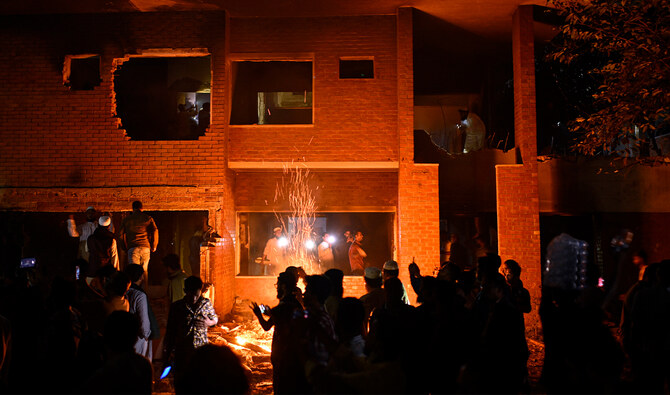Thousands of protesters in Bangladesh set fire to the home of the country’s founding leader, Sheikh Mujibur Rahman, as his daughter, ousted Prime Minister Sheikh Hasina, called on her supporters to resist the interim government.

The South Asian nation, home to 170 million people, has faced ongoing political strife since Hasina fled to neighboring India in August following weeks of violent protests against her rule that left more than 1,000 dead.
– Protesters attack historic residence amid Hasina’s scheduled online speech
– Demolition of Sheikh Mujibur Rahman’s house continues for a second day
– Hasina calls on supporters to stand against the interim government
Witnesses reported that thousands of demonstrators, some carrying sticks and hammers, gathered outside the historic residence and independence monument late Wednesday. Others arrived with a crane and an excavator to dismantle the building.
By Thursday, much of the house’s front facade had been destroyed, with protesters breaking inside to remove steel, wooden fixtures, and books. The attack was part of a wider demonstration, dubbed the “Bulldozer Procession,” aimed at disrupting Hasina’s scheduled online address.
Many protesters, including members of the “Students Against Discrimination” group, expressed anger over Hasina’s speech, viewing it as a direct challenge to the newly formed interim government.
The interim government, led by Nobel laureate Muhammad Yunus, has struggled to control the escalating unrest. Demonstrators have increasingly targeted symbols associated with Hasina’s administration, including the residence of her father, which was first set ablaze in August.
Sheikh Mujibur Rahman’s house holds deep historical significance, as it was from there that he declared Bangladesh’s independence from Pakistan in 1971. Mujibur Rahman and most of his family were assassinated there in 1975, with Hasina among the few survivors. She later converted the house into a museum honoring her father’s legacy.
“They can demolish a building, but not history. History takes its revenge,” Hasina said in her speech Wednesday, urging Bangladeshis to resist the interim government, which she accused of taking power unconstitutionally.
Yunus’ press office distanced the administration from the attack on Mujibur Rahman’s residence, calling it “unintended and unwanted” but attributing it to anger over Hasina’s leadership.
“Sheikh Hasina has insulted and humiliated those who sacrificed themselves in the July uprising,” Yunus’ office said in a statement. “Sheikh Hasina has threatened to create instability in the country.”
Political analysts suggest that those who led last year’s movement against Hasina fear she could return to power, reviving her Awami League party.
Despite promises of reform, Bangladesh’s interim government has yet to deliver significant economic or social changes, according to Shakil Ahmed, associate professor of government and politics at Jahangirnagar University.
“The government is managing politics, not the economy and society,” Ahmed said, noting that the ongoing unrest stems from deeper economic and social grievances.



